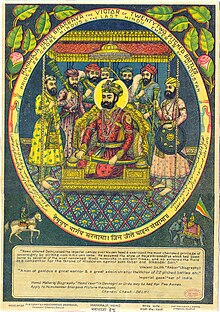Hemu
Hemu (/ˈheɪˌmuː/; also known as Hemu Vikramaditya and Hemchandra Vikramaditya; died 5 November 1556) was a Hindu king who previously served as a general and Chief Minister of Adil Shah Suri of the Suri dynasty during a period in Indian history when the Mughals and Afghans were vying for power across North India. He fought Afghan rebels across North India from the Punjab to Bengal and the Mughal forces of Humayun and Akbar in Agra and Delhi, winning 22 battles for Adil Shah.

Hemu claimed royal status after defeating Akbar's Mughal forces on 7 October 1556 in the Battle of Delhi and assumed the ancient title of Vikramaditya that had been adopted by many Hindu kings in the past. A month later, Hemu was wounded by a chance arrow and captured unconscious during the Second Battle of Panipat. Akbar's regent, Bairam Khan beheaded the almost dead Hemu shortly thereafter.
Quotes
edit- By the decree of the Al-mighty an arrow struck Himun in the forehead… (His soldiers) saw how matters stood, and he sustained a complete defeat. When Shah Kuli Beg was told of what had occurred, he came up to the elephant (of Himun) and brought it into the presence of Bairam Khan. Bairam Khan… caused Himun to descend from the elephant and took him before the young and fortunate prince and said, ‘As this is our first success, let your Highness’s own august hand smite this infidel with the sword.’ The Prince, accordingly, struck him and divided his head from his unclean body.
- Ahmad Yadgar. Elliott and Dowson, The History of India, as Told by Its Own Historians, Vol. V, pp. 65-66.
- Himuin was excessively arrogant on account of his troops and elephants. He advanced, fought, and routed the Mughals, whose heads lay in heaps, and whose blood flowed in streams. He thus at first vanquished the Mughal army; but as the brilliancy of the star of Prince Akbar’s fortune was not destined to be diminished, it chanced that, by the decree of the Almighty, an arrow struck Himun in the forehead. He told his elephant driver to take the elephant out of the field of battle...
“When Shah Kuli Beg was told of what had occurred, he came up to the elephant, and brought it into the presence of Bairam Khan. Bairam Khan, after prostrating himself, and returning thanks, caused HImUn to descend from the elephant, after which he bound his hands, and took him before the young and fortunate Prince, and said, As this is our first success, let Your Highness’s own august hand smite this infidel with the sword. The Prince, accordingly, struck him, and divided his head from his unclean body (Nov. 5, AD 1556).- Tarikh-i Salatin-i Afaghana of Ahmad Yadgar, translated in Elliot and Dowson, Volume V, pp. 65-66. Quoted in S. R. Goel, The Calcutta Quran Petition (1999) ISBN 9788185990583
- (Bairam Khan said): ‘This is your first war (ghazd), prove your sword on this infidel, for it will be a meritorious deed.’ Akbar replied: ‘He is now no better than a dead man, how am I to strike him? If he had sense and strength, I would try my sword.’ Then in the presence of them all, the Khan as a warrior of the faith, cut him down with the sword.
- Abdul Kadir Badauni. Elliott and Dowson, The History of India, as Told by Its Own Historians, Vol. V, p 253.
- Akbar was now informed that Haji Khan, a ghulam of Sher Khan Afghan [Sher Shah], a brave and able general, was setting up pretensions to rule in Alwar and that Himu’s father and wife, and all his property and wealth, were in that country. So the Emperor sent Nasiru-l Mulk [Pir Muhammad Sarwani] with a select force to attack him. Haji Khan, in dread of the Imperial army, fled before it arrived. Alwar and all the territory of Mewat thus came into the Imperial power. The fugitives proceeded to Dewati-majari, a strong place, which was Himu’s family home. Much resistance and fighting followed. Himu’s father was taken alive, and brought before Nasiru-l Mulk, who tried to convert him to the faith; but the old man said, ‘For eighty years I have worshipped God in the way of my own religion; how can I now forsake my faith? Shall I, through fear of death, embrace your religion without understanding it?’ Maulana Pir Muhammad treated his question as unheard, but gave him an answer with the tongue of the sword. He then returned with much spoil and fifty elephants to the Emperor.
- Akbar-Nama of Abul Fazl, translated in Elliot and Dowson, Volume VI, p. 21. Quoted in S. R.Goel, The Calcutta Quran Petition (1999) ISBN 9788185990583
- …The king struck Hemu with his sword and he won the title of Ghazi…
- Tarikh-i-Akbari of Muhammad Arif Qandhari, translated into English by Tanseem Ahmad, Delhi, 1993, p. 74. Quoted in S. R. Goel, The Calcutta Quran Petition (1999) ISBN 9788185990583
- When his reign began, it gave no signs of the opening of a new era in the religious policy of the Mughal emperors. Almost his first act of state was to earn religious merit and the title of Ghazi (slayer of infidels) by striking at the disarmed and captive Hemu after his defeat at the second battle of Panipat. Akbar was not asked to whet his sword on Hemu because he was a rebel, but because he was a Hindu. He was to perform not the task of the official executioner, but that of a victorious soldier of Islam. Abu’l Fazl would have us believe that the boy Akbar was wiser than his years and refused to strike a defenceless enemy. But most other writers are agreed that he struck at Hemu and earned the title of the Ghazi thereby.
- Sharma Sri Ram. 1988. The Religious Policy of the Mughal Emperors. 3rd ed. New Delhi: Munshiram Manoharlal. ch 3